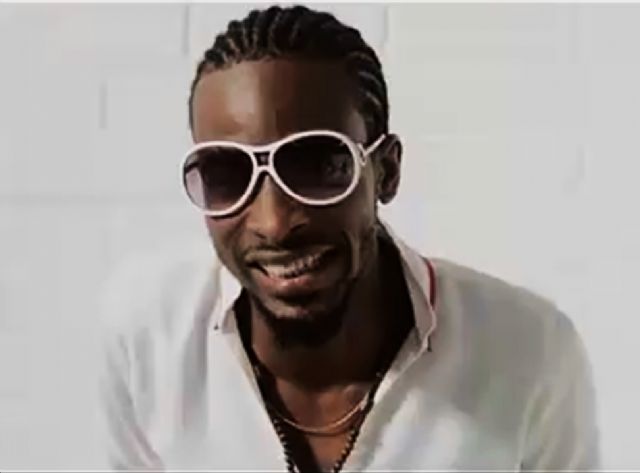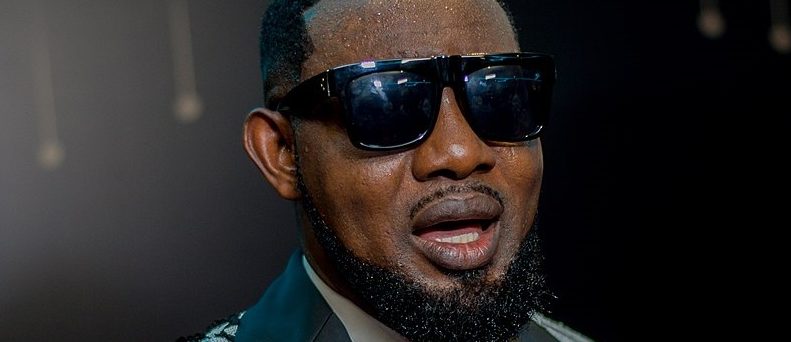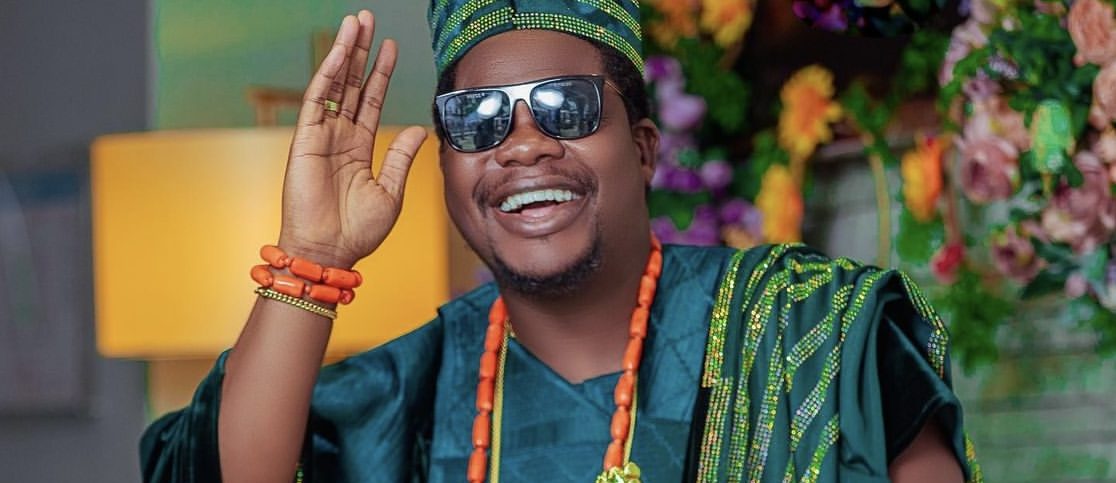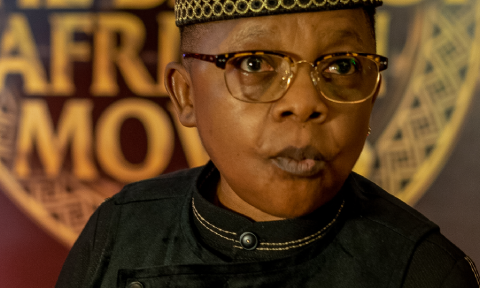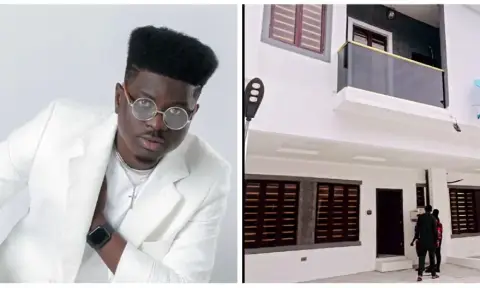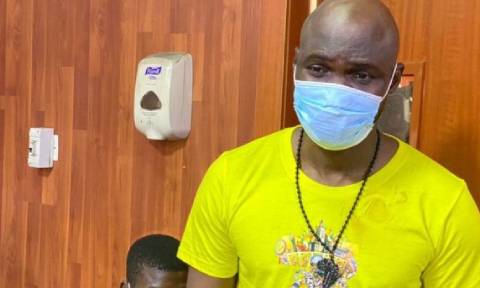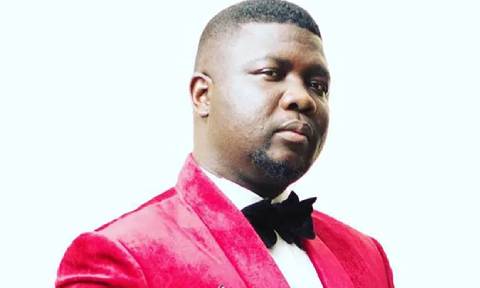
Adebayo Ajibola, popularly known as Holy Mallam, has gone through the rough side of life to become the success he is today. In this interview with Senior Reporter, Ifeoma Meze, he spoke on the many struggles on his way to the top.
At your 10th anniversary in 2010 you spoke extensively about how you became a comedian and how tough things were for you while growing up. Were things really that tough those days?
Growing up wasn’t rosy at all, it was really tough but we thank God for the present. If you can overcome the challenges of the past then you can appreciate the present better, so I ascribe all the glory to God.
Many usually think you are from Benue or from the North because of the accent you use in your comedy.
No, I’m from the northern part of Ogun State, Ijebu North Local Government. Many people think that I’m a northerner because of the stage name but I picked up the name as a way of carving a niche for myself in the industry. My mother is from Bida, Niger State and my wife is from Abia State. My growing up was interesting in the sense that I was born with a silver spoon, but as time went by, the silver spoon lost its value, it later became copper spoon and later it became wooden spoon. In fact, at a time, when there was kerosene scarcity, we couldn’t afford anything better than to go for wood, so we cooked with firewood. So eventually it went bad that there was no wooden spoon.
So going to school was not that easy too
In the beginning, things were very okay. Like I said, I was born with a silver spoon in the mouth, so things were very okay at the beginning. I went to Noral Nursery and Primary School, then to Command Secondary School, Jos and Lagos State University (LASU). I was studying communication arts at the time (even though I didn’t finish from LASU). Then I started training with USAID, John Hopkins University. The training lasted for two years and they made me what I am today. They trained me in effective communication. USAID made a better impact on my life through the training they gave me than LASU. They trained us on a platter of gold. As a student of LASU, I was also running that programme but at a time I couldn’t finish from LASU.
What happened?
My dad died in 2002, he paid my school fees to an extent but later he died. I couldn’t finish at LASU because there was no money, we just couldn’t keep up, house rent was there, feeding, my younger ones and other stuff. I had to drop out from LASU. It was the USAID programme that I graduated from after a two-year training. I didn’t do a regular four-year university programme. I did part time because I had to hustle to make ends meet.
Was USAID training a kind of scholarship?
My mum was a nurse, she was working with them but things were really tough and bad. There was no money for school fees, we could even hardly feed. So, when the opportunity came for the training and since my mum was a nurse with them, she introduced me as one of the youth to benefit from the programme. So, I worked in the youth department, they empowered me because I was nothing. I had no self-esteem, please get me right, not low-self esteem, I mean no self-esteem at all before USAID came to my life. They created self-esteem for me to start with, though I could make people laugh but there was no self-esteem because there was no hope, there was no life.
But your mum was working; you said she was a nurse
For a huge family of five, it was tough. In fact, to complement her small salary, she sold nylon and pure water. I was even selling pure water for her 12 years ago. Before it even got to that I hawked bread in Festac Town. My mum is a very strong woman, very hardworking, operates with a sense of purpose, though the capital was small, she was willing to go on. I adore and cherish her.
You do not crack jokes with churches and you avoid being vulgar
Vulgar is not my kind of comedy and I try not to play with things pertaining to God. I try to be as subtle as I can and still be funny. That is how the stage name Holly Mallam came about.
The last time we spoke, your wife was expecting, have she put to bed?
Yes. She put to bed last month. We have a bouncing baby boy. I now have two lovely boys and a girl. The girl is the first and I am working very hard to make sure I give them the best. My family is very special to me.
You are rarely seen at social events, do you select shows you attend?
If I am invited, I attend and in most cases I am not much of an outdoor person. I work more on my event management outfit and as a compere. I recently did an animation project for LASTMA on Okada helmet and road rules. It has been on air since last year.
Tell us more about the USAID programme, was it just a youth empowerment thing?
It was beyond youth empowerment. It’s a non-governmental organisation that does not work with a military regime. John Hopkins University came in as a partner to USAID then. During my own time, we had centre for development and population activities and I was also trained by those ones too; there was also family health insurance and so on. They couldn’t work with the federal ministry of health then because of the military rule, so that was why they came to the grassroots. We were trained to do field work and we were given some stipends, so they empowered us. They took us up from nothing, transferred skills into us, empowered us and made us. We went through skill acquisition, information education and communication in health was what I majored in and also peer health education. So even in LASU, it was communication arts, so everything about my life has revolved around communication and the arts. But I bet you what I gained from USAID in two years, no institution in Nigeria can offer it in seven years, I am very serious and this is not to spite any Nigerian institution. Though some people might think I am saying this because I dropped out of LASU but it’s not so; at least, I was in LASU up to 300-level, so it’s not because I left there but because I know what I gained from USAID.
So, after the empowerment thing, you started working?
Yes, I started working with USAID as a field trainee. See, every year in my life from 1995 took a significant change. 1995, I was a teacher where I was paid N500 monthly, in 1996, my mum didn’t let me work because dad who was an insurance broker then wanted me to read insurance, later I worked at Doyin Cubes company in Okokomaiko as a casual staff where I earned N 1000 per month. While this was on, my mum introduced me to the USAID and I grabbed the opportunity because I wasn’t going to be a casual labourer all my life. So, in 1999, I had my final exams at USAID programme and I emerged the best peer health education student.
When former U.S. president, Bill Clinton came to Nigeria , I went and represented Lagos in Abuja. That was how I broke free from mediocrity, stagnation, wrong mentality, poverty and all that. The seven skills of communication I learnt help today in my comedy and MC profession. Again, now I am a motivational speaker to the youth because I want them to be a better people for Nigeria and the entire world, and for those that are having it rough now, I want to let them know that with God, determination and being focused, they can earn a legitimate living and realise their dream in life. I am a living example.
Now that things are better for you, do you intend going back to finish your programme at LASU or start a fresh course in any university?
Well, I am doing international degree courses in Canada and U.S.A. This is because I am going to be an ambassador of Nigeria to nations.
How did you pick up the comedy thing?
It’s been in me right from when I was a child. I have always made people laugh, even though I didn’t know it could be a career. I will just talk and people would laugh. I also played drums. Back then, the likes of Alam Blo will come to my church to do comedy and my guys in the choir would say, “Boy you can do the thing these guys do, you can make people laugh too.” But I couldn’t because I had no self-esteem at all then, and I was very shy especially when I was in the midst of female. Gradually, after the training with USAID, I started coming out of my shell. I started comedy at first in my church on the altar. Then in school (LASU), one day, they gave me an opportunity to do comedy for the students and I was paid N500.00, that was in year 2000. I will say that was my first professional job as a comedian. From there, somebody introduced me to one job again, from there somebody linked me with Nestle Foods; I did a show for them and was paid N35,000. That was the biggest I got then and fast, I bought MTN Sim pack for N21,000 and that was how it continued up till where I am today. I started going out with Dr. Lily Ejuonama to events and I started learning the professional MC stuff from him, he never knew I was learning from him until he saw me at one event where I was the MC, and I did it so well. Then he asked where I got the skill and I told him all the while I was going out with him, I was secretly learning from him. I like the fact that I make people laugh, make them happy and cheer them up, it makes me feel good. So I’m not doing comedy just for the money, but because it gives me pleasure seeing people laugh and happy, it’s the passion. And that is why I talk about these things at my shows because I need to let them know the truth about life and impart hope in people from my personal experiences.
